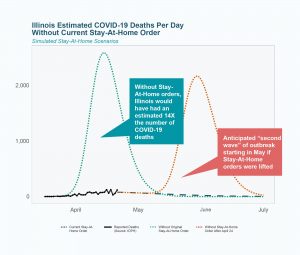Gov. Pritzker says shut down with modifications to stay in place
Chronicle Media — April 23, 2020
Gov. J.B. Pritzker answers questions at his daily coronavirus press briefing on Thursday, April 23 in Chicago. (www.illinois.gov)
A day after the Illinois Department of Public Health reported the highest single-day increase in confirmed COVID-19 cases, Gov. J.B. Pritzker announced Thursday he is extending a modified stay-at-home order statewide through May.
The IPDH reported 2,049 new cases on Wednesday and another 1,826 more confirmed cases were reported on Thursday along with 123 additional fatalities.
The number of Illinoisans who have now died from coronavirus is 1,688 and total number of people confirmed as having the virus reached 36,934.
The disease has been detected in 96 of Illinois’ 102 counties.
On the current trajectory, the state is projected to see a peak or plateau of deaths per day between late April and early May, but if the stay at home order were lifted this week, the model anticipates a second wave of the outbreak in Illinois starting in May, which would claim tens of thousands of lives and greatly exceed the state’s hospital capacity.
“Make no mistake, Illinois has saved lives. By staying home and social distancing, we have kept our infection and death rates for the months of March and April thousands below the rates projected had we not implemented these mitigation strategies,” said Pritzker. “I know how badly we all want our normal lives back. But this is the part where we have to dig in and understand that the sacrifices we’ve made as a state to avoid a worst-case scenario are working — and we need to keep going a little while longer to finish the job.”
 The order with modifications will take effect May 1.
The order with modifications will take effect May 1.
- OUTDOOR RECREATION: State parks will begin a phased re-opening under guidance from the Department of Natural Resources. Fishing and boating in groups of no more than two people will be permitted. A list of parks that will be open on May 1 and additional guidelines can be found on the Illinois Department of Natural Resources website HERE .
- Golf will be permitted under strict safety guidelines provided by the Illinois Department of Commerce and Economic Opportunity (DCEO) and when ensuring that social distancing is followed.
- NEW ESSENTIAL BUSINESSES: Greenhouses, garden centers and nurseries may re-open as essential businesses. These stores must follow social distancing requirements and must require that employees and customers wear a face covering. Animal grooming services may also re-open.
- NON-ESSENTIAL RETAIL: Retail stores not designated as non-essential businesses and operations may re-open to fulfill telephone and online orders through pick-up outside the store and delivery.
- FACE COVERINGS: Beginning on May 1, individuals will be required to wear a face-covering or a mask when in a public place where they can’t maintain a six-foot social distance. Face-coverings will be required in public indoor spaces, such as stores. This new requirement applies to all individuals over the age of two who are able to medically tolerate a face-covering or a mask.
- ESSENTIAL BUSINESSES AND MANUFACTURING: Essential businesses and manufacturers will be required to provide face-coverings to all employees who are not able to maintain six-feet of social distancing, as well as follow new requirements that maximize social distancing and prioritize the well-being of employees and customers. This will include occupancy limits for essential businesses and precautions such as staggering shifts and operating only essential lines for manufacturers.
- SCHOOLS: Educational institutions may allow and establish procedures for pick-up of necessary supplies or student belongings. Dormitory move-outs must follow public health guidelines, including social distancing.
The IDPH will also be issuing guidance to surgi-centers and hospitals to allow for certain elective surgeries for non-life-threatening conditions, starting on May 1. Facilities will need to meet specific criteria, including proper PPE, ensuring enough overall space for COVID-19 patients remains available, and testing of elective surgery patients to ensure COVID-19 negative status.



